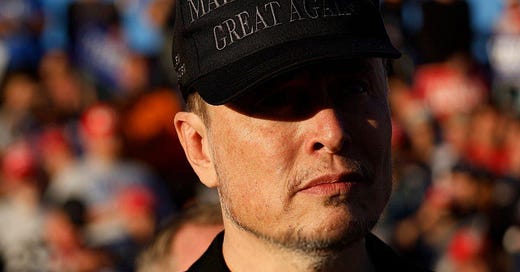Over the past decade, Elon Musk has been one of the most prominent advocates for the importance of AI safety. Musk, who has said that there’s a 10-20% chance that advanced AI systems will lead to human extinction, has consistently urged society to take the risks of advanced AI more seriously, calling for federal regulation on AI and becoming one of very few tech CEOs to endorse the SB 1047 effort to regulate AI in California.
Given Musk’s self-professed views that getting AI right is among the most important challenges in the world, you would think that he would be using his newly-gained political power to influence the Trump White House, place sensible people in important jobs, and help bring about a safe AI future.
You’d be wrong.
As Trump re-enters the Oval Office, signs of Musk’s influence over AI policy are conspicuously absent. While Musk is distracted by “government efficiency” and picking fights with foreign leaders, Trump’s AI team is being staffed by people who have consistently dismissed AI safety concerns and regulatory proposals.
Sriram Krishnan, Trump’s incoming AI policy adviser, was until recently a partner at Andreessen Horowitz, a firm which has led some of the most vociferous campaigns against AI regulation (often resorting to lies and deception in the process). The firm’s boss, Marc Andreessen, is reportedly involved in staffing decisions across the administration. And Michael Kratsios, who is returning as director of the Office of Science and Tech Policy, is closely linked to Peter Thiel — another prominent skeptic of AI safety concerns.
This is close to a worst-case scenario for AI safety. While some hoped that Musk’s presence in the White House could help rein in AI companies and address the many national security threats advanced AI models pose, the opposite is true: a deregulation-obsessed faction of the tech right has seized control, threatening to undo the minimal policy progress made in the past few years and significantly increasing the risk of an AI catastrophe.
The reasons for Musk’s apparent disengagement are unclear. Perhaps his influence with Trump has been overstated. But given his work on DOGE and other projects, that seems unlikely. More probable is that other priorities have captured his attention. Since November’s election, he does not appear to have tweeted about AI policy once, instead focusing his energy on a variety of other issues.
Yet if Musk genuinely believes there is a 10-20% chance of human extinction from AI, his failure to focus on reducing that risk represents a stunning abdication of responsibility. Political power is fleeting, and Musk has a once-in-a-lifetime opportunity to steer policy in a better direction. By his own lights, everything else Musk cares about — as important as it may be — pales in comparison to the importance of getting this right.
So what should he do? First, encourage Trump to appoint people who take catastrophic AI risks seriously and are competent enough to handle them well. Undoing already-made staffing decisions will no doubt be difficult, but at the very least Musk could press Trump to introduce some voices to counterbalance the reckless accelerationism of the Andreessen Horowitz crowd.
Second, Musk should devote much of his own time to working on AI policy, perhaps taking the AI portion of David Sacks’ portfolio. With his technical expertise and understanding of the risks, Musk is well-placed to act as a bridge between Silicon Valley and DC, and could play an important role in crafting AI policy that adequately addresses the most-important risks while avoiding unnecessary constraints on innovation. Musk’s role as CEO of xAI would doubtless present conflicts of interest … but in this administration, such difficulties seem easy enough to overcome.
Voters would certainly prefer this to the present arrangement: according to AI Policy Institute polling, 62% of voters would rather the Trump administration focus on Musk’s AI policy proposals, with only 11% supporting Andreessen’s preferred policies. Among Republicans, Musk’s AI views are even more popular: 76% said they prefer Musk’s views to Andreessen’s, while 81% said they’d like Musk to devote “significant time” to working on AI policy.
Musk has previously said that AI safety is “vital to the future of civilization”. Now is the time for him to show he means it.




